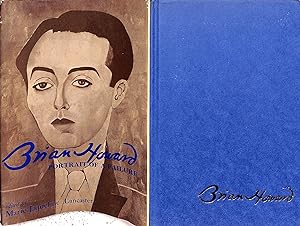A propos de cet article
[639] pp. LANCASTER, Marie-Jaqueline Anthony Blond Ltd 1968 9.25" x 6.5" The jacket illustration is from a portrait by John Banting Brian Christian de Claiborne Howard (13 March 1905 15 January 1958) was an English poet and later a writer for the New Statesman. Biography Howard was born to American parents in Hascombe, Surrey, of Protestant descent, a descendant of Benjamin Franklin,[2] and brought up in London; his father Francis Gassaway Howard - son of the writer Frank Gassaway, known as 'Derrick Dodd'[3] - was an associate of James Whistler. He was educated at Eton College, where he was one of the Eton Arts Society group including Robert Byron, Harold Acton, Oliver Messel, Anthony Powell and Henry Yorke. He entered Christ Church, Oxford in 1923, not without difficulty. He was prominent in the group later known as the Oxford Wits. He was part of the Hypocrites' Club that included Harold Acton, Lord David Cecil, L. P. Hartley and Evelyn Waugh. Railway Club at Oxford, conceived by John Sutro, dominated by Harold Acton. Left to right, back: Henry Yorke, Roy Harrod, Henry Weymouth, David Plunket Greene, Harry Stavordale, Brian Howard. Middle row: Michael Rosse, John Sutro, Hugh Lygon, Harold Acton, Bryan Guinness, Patrick Balfour, Mark Ogilvie-Grant, Johnny Drury-Lowe; front: porters. At Oxford Howard was part of the Railway Club, which included: Henry Yorke, Roy Harrod, Henry Thynne, 6th Marquess of Bath, David Plunket Greene, Edward Henry Charles James Fox-Strangways, 7th Earl of Ilchester, Brian Howard, Michael Parsons, 6th Earl of Rosse, John Sutro, Hugh Lygon, Harold Acton, Bryan Guinness, 2nd Baron Moyne, Patrick Balfour, 3rd Baron Kinross, Mark Ogilvie-Grant, John Drury-Lowe.[4] It has been suggested[5] that Howard was Waugh's model for Anthony Blanche in Brideshead Revisited. But Waugh wrote, to Lord Baldwin, "There is an aesthetic bugger who sometimes turns up in my novels under various names that was 2/3 Brian [Howard] and 1/3 Harold Acton. People think it was all Harold, who is a much sweeter and saner man [than Howard]."[6] At this time he had already been published as a poet, in A. R. Orage's The New Age, and the final Sitwell Wheels anthology. He used the pseudonyms "Jasper Proude" and "Charles Orange." His verse also was in Oxford Poetry 1924. His poetry was admired and promoted by Edith Sitwell in the late 1920s. In the late 1920s, he was a key figure among London's "Bright Young Things" a privileged, fashionable and bohemian set of relentless party-goers, satirised in such novels as Evelyn Waugh's 1930 Vile Bodies where the character of Miles Malpractice owes something to Howard. Apart from Waugh, Howard knew all this circle, including Nancy Mitford, Henry Yorke, Harold Acton, and especially Allanah Harper[7] and Nancy Cunard. He maintained contact with both throughout his life. In 1929 he was famously involved in the "Bruno Hat" hoax when the fashionable Hon Mr. & Mrs. Bryan Guinness promoted a spoof London art exhibition by an apparently unknown German painter Bruno Hat (impersonated by the German-speaking Tom Mitford, brother of Nancy and Diana Mitford the latter at the time Mrs. Guinness, a socialite, arts' patron and friend of Howard, Lytton Strachey, Evelyn Waugh, Boris Anrep, Dora Carrington, John Betjeman and other artistic and literary figures, before her second marriage to British fascist leader Sir Oswald Mosley). Bruno Hat's paintings were the work of Brian Howard. Howard is credited with coining the phrase, "Anybody over the age of 30 seen in a bus has been a failure in life", often wrongly attributed to Margaret Thatcher. According to Daily Telegraph correspondent and historian, Hugo Vickers, (writing in November 2006), the author was Brian Howard. The phrase came into wider use when used by Loelia, Duchess of Westminster, in her memoir Grace and Favour (1961). Subsequently he led a very active social life, tried to come to terms with his homosexuality, and published only one sub.
N° de réf. du vendeur 19647
Contacter le vendeur
Signaler cet article




